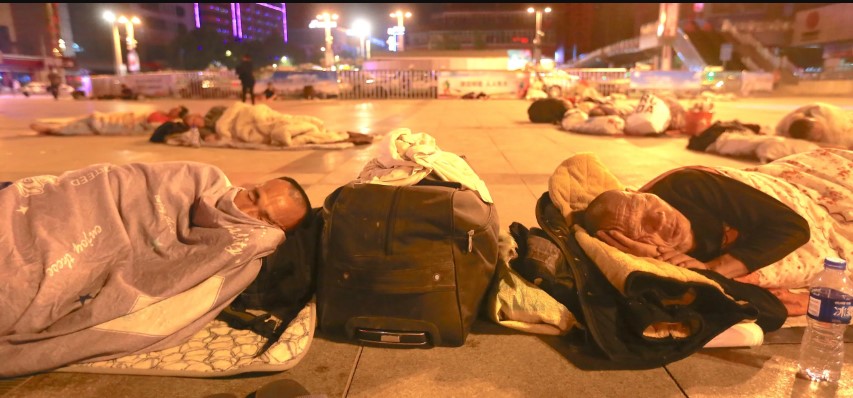China’s Billion-Dollar Airports Now Shelters for the Homeless

China's billion-dollar airports, once symbols of progress, have quietly turned into "free hotels" for the unemployed and homeless. As mass layoffs become widespread, degrees lose their value, and students live adrift, these grand structures now serve a different purpose. Beijing Daxing International Airport, a landmark that cost 80 billion yuan (approximately 11 billion USD) to build, epitomizes this transformation five year after its opening.
Every night, as darkness falls, a diverse group of people floods into the terminal. Some curl up on soft sofas, others lie on reclining chairs, and some even bring their own blankets, turning the airport into a temporary home. These individuals include young job seekers who can't afford hotels, students preparing for graduate school or civil service exams, and migrant workers taking a break from their struggles in the city. Airport staff recognizes these people, but as long as they don't disrupt order, they turn a blind eye.
The contrast is surreal. Just five years ago, young people eagerly flocked to Beijing for opportunities. Today, these highly educated individuals have perfected the art of saving money, not out of choice, but out of necessity. Daxing Airport is not the only refuge; within a 3 km radius, a small economic zone has sprung up catering to these drifters. Cheap hostels, 24-hour convenience stores, luggage storage services, and even modest farm stays offer temporary relief.
A visitor from Shanghai recently set out to experience airport survival first hand and documented the nightlife there. In the middle of the night, the Beijing Capital International Airport T1 terminal was filled with people staying overnight. Many were sleeping in the arrival hall, already lying down and fast asleep. When he went to the departure level, he found the Starbucks still crowded at midnight. Some people were working on their laptops, while others had already fallen asleep in their chairs.
This scene isn't unique to Daxing Airport or Beijing Capital International Airport. From Guangzhou Baiyun Airport to Chengdu Shuangliu Airport, major city airports across China are quietly transforming into overnight shelters for workers. Everywhere you can find rows of chairs, sofas, and benches suitable for sleeping, with people curled up for the night. This reflects the survival struggles faced by China's educated workforce today.
A professional used to be a programmer at a major tech company in Beijing, a sought-after job in the industry. In 2023, after several rounds of "optimizations" (a euphemism for layoffs), he was laid off. He returned to his hometown of Wenzhou but soon realized that local IT jobs paid only a third of what he earned in Beijing, and positions were scarce. He returned to Beijing to look for work. Three months passed, and despite sending out hundreds of résumés and attending numerous interviews, he couldn't find a job that paid enough to survive.
This situation is not uncommon in the tech industry. IBM's Beijing Research Centre laid off over a thousand employees in one go. Meanwhile, Alibaba and Tencent are also going through "optimizations." Those being let go are not poorly qualified; most have bachelor's degrees, and many hold masters or doctoral degrees. Even fresh graduates are getting caught up in this.
After the pandemic, foreign capital withdrew, and internet companies began laying off employees. University graduates struggled to find jobs, and those laid off first were often young people from small towns with no connections. These young people, mostly from working-class families, had always been taught that education would change their fate. This may have been true in the 1980s, but today, unless you are exceptionally talented, education alone no longer guarantees success.
It also became harder for Chinese companies to list in the US, even if they were fully compliant and not sanctioned. Regardless of their success, they couldn't exit their investments in the US, and investments in Chinese start-ups dipped to its lowest. By 2023, only 1,200 start-ups were launched in China, just a fraction of the number five years ago. Without investment, new companies can't form, and new jobs aren't created. Meanwhile, existing companies continue laying off employees.
In 2018, if 50,000 start-ups each hired just 5 to 10 people, that created hundreds of thousands of jobs. By 2023, with only 1,200 start-ups, over 95% of those opportunities vanished. Highly educated young people who should be on the front lines of innovation now wait for dawn in airports, and elderly workers shiver in the cold, hoping for jobs. This is the harsh reality behind the so-called second-largest economy.




![From Kathmandu to the World: How Excel Students Are Winning Big [Admission Open]](https://nepalaaja.com/img/70194/medium/excel-college-info-eng-nep-2342.jpg)
